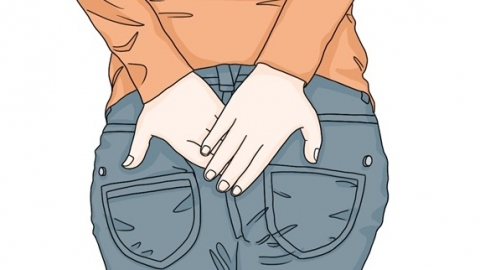What should I do if I have hemorrhoids and experience rectal bleeding during bowel movements?
Generally, rectal bleeding caused by hemorrhoids may be due to poor dietary habits, prolonged sitting or standing, internal hemorrhoid bleeding, external hemorrhoid bleeding, or mixed hemorrhoid bleeding. It is recommended to seek timely medical attention, identify the underlying cause, and undergo symptomatic treatment under a doctor's guidance. A detailed explanation is as follows:

1. Poor dietary habits: Long-term consumption of spicy, greasy, or irritating foods, as well as insufficient dietary fiber intake, may lead to constipation or dry stools, increasing anal pressure during bowel movements and thus causing hemorrhoid bleeding. It is important to adjust the diet, increase dietary fiber intake, and consume more fresh vegetables and fruits.
2. Prolonged sitting or standing: Maintaining the same posture for extended periods, such as sitting or standing for long durations, may cause poor circulation in the pelvic area, worsening hemorrhoid symptoms, including bleeding. Avoid staying in the same posture for too long, get up and move around regularly to promote pelvic blood circulation.
3. Internal hemorrhoid bleeding: Internal hemorrhoids are located inside the anal canal, and when pressure is exerted during bowel movements, the hemorrhoidal nodules may rupture and bleed. It is important to maintain regular bowel movements, avoid prolonged sitting, and perform anal lift exercises frequently.
4. External hemorrhoid bleeding: External hemorrhoids form due to the dilation of veins around the anus. When inflammation or thrombosis occurs, bleeding may result. Follow medical advice to use medications such as AnTai Ointment, Yunnan Baiyao Hemorrhoid Ointment, or Ma Yinglong Musk Hemorrhoid Ointment to alleviate symptoms.
5. Mixed hemorrhoid bleeding: Mixed hemorrhoids occur when internal and external hemorrhoids coexist and connect with each other, increasing the size and pressure of the hemorrhoidal nodules, making them more prone to rupture and bleeding. For severe mixed hemorrhoids, surgical treatment under medical guidance may be necessary, such as hemorrhoidal artery ligation or rectal mucosal circumferential resection.
During the recovery period, it is important to maintain proper hygiene around the anal area, develop healthy lifestyle habits, avoid prolonged bowel movements, and promote overall recovery.







